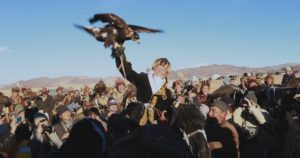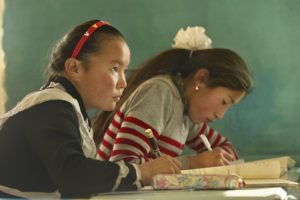
Set in the sprawling, exotic locale of Western Mongolia, The Eagle Huntress is an exhilarating peek into the highly unique lives of a family preparing for the region’s prestigious 18th annual Golden Eagle Festival. Every October, over seventy veteran fox hunters arrive from as far as China, to display their honed skills and compete on a national level. The long enmeshed tradition has been for fathers to train sons in the art of the hunt.
And yet, for the first time in twelve generations, a thirteen year old girl, Aisholpan, has chosen to represent her Kazakh family and enter the male dominated sport as a contestant. Her father, Nurgaiv, and mother, Alma, have complete confidence in her skills and determination as their daughter had been fascinated by her father’s eagles even as a small child.
Otto Bell, a young director, had previously made short films all over the world, including Vietnam, Japan, Uganda and Russia with his resourceful Cinematographer, Simon Niblett. Yet it was a compelling picture of a female child commanding a fifteen pound, giant eagle on a frozen mountainside in Mongolia, that drove him to produce his first feature length film. With his life savings ($80,000), and the plan to incur even more debt, there was something so mighty about this little girl agitating tribal leaders in her small town, that her story needed to be told.
The Golden Eagle festival is ingrained in northwestern Mongolia’s culture and gives its hunters a sense of identity, pride and ownership of their way of life. The contestants must be masters of horse riding, accuracy, and agility as they have a symbiotic relationship with the massive eagle who (may or may not) follow their every command. Because Aisholpan’s father trained her for the contest for months, Bell and his three man crew were able to capture much of the process–the patience, diligence and physical strength needed to gain the trust of a fierce wild animal with the wing span of seven feet and razor sharp talons.
How did the intrepid crew even begin to ingratiate themselves? Bell noted, “They are a very hospitable and welcoming culture and when they get guests in their remote town, the guests are prioritized.” A big crew wouldn’t have yielded the intimate results of capturing the family’s humble, every day life. “We lived with the family for weeks at a time, and once a week went back to the main town.” Bell’s DP, Simon Niblett, whom he calls a “real inventor,” created and modified his own drones and cranes, resulting in shots of genuine family dynamics, without the crew being intrusive. Niblett recalls making “four trips to Mongolia, spread over nine months, with each trip lasting about two weeks each.”

“The first challenge is to get there!” Niblett exclaimed. Their journey took them from the UK to Russia, back down to Mongolia, to an intermittent plane, then hours in a rickety van. The crew set up tents, and ate ration packed, pre made meals. Regardless of the remote, freezing terrain, Niblett’s goal was “to get cinematic shots where there are no roads, without stopping what the family was doing.”
He was also able to capture telling footage of how the tribal leaders gave the crew attitude about a mere girl daring to enter their hunters’ domain. Some of them even grouse, “She’ll never make it through a real hunt.” When Aisholpan arrives at the event in traditional costume on her horse, the camera captures the stares, intimidating sneers and outright hostility to her very existence. But the thirteen year old, who earns high grades in school, and paints her nails like any other teenager across the globe, proves herself to be legitimate. She’s a genuine natural eagle hunter with full command of her skill set and the unshakable confidence of her family’s rightful legacy.
Once the old tribesmen realized that she could be used to attract more tourists and interest to their little town, they reluctantly relented that dismissing her would make them appear even more foolish, sexist and bitter on camera. With the inclusive, loving mindset of both her father and grandfather she can fully realize her talents in a patriarchal environment. In one of the greatest lines of dialogue in the film, the event director and leader of the sacred, prestigious Eagle Hunt exclaims, “May our offspring be LIKE HER.”





